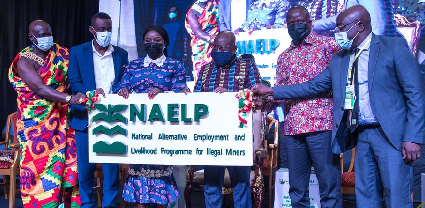
Alternative livelihood programme: 220,000 illegal miners to gain employment
About 220,000 illegal miners will be provided with good alternative livelihood options under a new national programme, the National Alternative Employment and Livelihood Programme (NAELP).
Under the programme, which is targeted at people affected by the crackdown on illegal mining (galamsey), the beneficiaries will be allocated space and also provided with technical assistance by geologists, mining engineers and other experts to ensure that they carry out mining activities in a responsible manner to protect lives and the environment.
The NAELP is hinged on six modules, including national land reclamation and re-afforestation; agriculture and agro-processing and apprenticeship, skills training and entrepreneurship.
The rest are responsible, viable and sustainable small-scale mining – community mining programme; mine support services and community enhancement projects.
Budgetary allocation
President Nana Addo Dankwa Akufo-Addo, who launched the programme in Tarkwa in the Tarkwa Nsuaem municipality in the Western Region yesterday, said he had instructed the Minister of Finance to make adequate budgetary allocation in the upcoming 2022 Budget and Fiscal Policy of the Government to fund the programme.
The new programme comes after the President had launched a similar one, the Community Mining Programme, which sought to set up in each mining district community mines to provide employment for the people, on July 25, 2019.
Exit route
The objective of the new programme is in line with the government’s vision of ameliorating the unintended and unavoidable hardships of the clampdown by Operation Halt.
Besides, NAELP is in recognition of the fact that minerals are finite, for which reason the programme is expected to play a complementary role as an exit route for miners when the resources are depleted.
Responsible mining key
President Akufo-Addo said the government was not against small-scale mining but illegal mining.
“Let me be clear: my government is not against small-scale mining; on the contrary, the government is in full support of responsible small-scale mining activities, as they provide an avenue for Ghanaians to participate in the mining industry and contribute substantially to our gold exports,” he said.
Leading producer
The President said available data showed that the small-scale mining industry accounted for more than 40 per cent of the country’s gold exports and played a critical role in making Ghana the leading producer of gold in Africa.
“Small-scale mining must, therefore, be promoted and encouraged, and we will do all that is necessary to promote it for our collective benefit. What we cannot do, and will not allow it to happen, is to permit mining activities that threaten the environment which sustains our lives and the lives and livelihoods of generations yet unborn,” he said.
“It is important to let you know that we owe it as a sacred duty to protect the environment, even as we reap the benefits of our natural resources. Small-scale mining can and must only be done responsibly,” the President added.
Far-reaching measures
Further to the government’s effort to ensure the protection of the environment, President Akufo-Addo said: “We have had to take far-reaching measures, including authorising the military in Operation Halt II, as well as decommissioning and demobilising machines and equipment used for illegal mining in forest reserves and on water bodies, which have been declared red zones for mining.”
The measures, he said, were necessary to halt and reverse the trend of the ever-increasing turbidity of the country’s waters and protect and safeguard the environment for posterity, as dictated by the Constitution.
The efforts, he said, had resulted in significant gains, with some of the water bodies visibly clearing up.
He deplored the resolve by some nation wreckers to mine in the night to evade the regulatory and the security agencies, warning that all those involved would be made to face the law.
A holistic approach to tackling the canker, he noted, required that while working with the security agencies for the protection and proper utilisation of natural resources, “we find alternative means of livelihood for those impacted by these actions.”
Relevant stakeholders
The Minister of Lands and Natural Resources, Mr. Samuel Abu Jinapor, said the ministry and the team undertook several consultations with relevant stakeholders to solicit their support for the measures taken.
“We have also embarked on a nationwide tour to mobilise mass support for government action,” he said.
Community mining
The minister said community mining had become the main fulcrum around which the nation sought to organise responsible small-scale mining, adding that so far, five community mining schemes, with 20 concessions, had been launched, which had the capacity to employ more than 26,300 people in direct and indirect employment.
The communities are Mmampehia in the Ahanta West municipality, Kwabre-Nuba in the Jomoro municipality, Adukrom in the Ahafo Ano South-East District, Jacobu in the Amansie Central District and Akyem Abaam in the Kwaebibirem District.
“We expect to launch 18 schemes with 100 concessions by the end of the year,” he added.
Important milestone
For his part, the Western Regional Minister, Mr. Kwabena Okyere Darko-Mensah, said the introduction of the NAELP was a most important milestone in the government's quest to make the sector work by making people mine in a more sustainable way for the benefit of the country and the environment.
